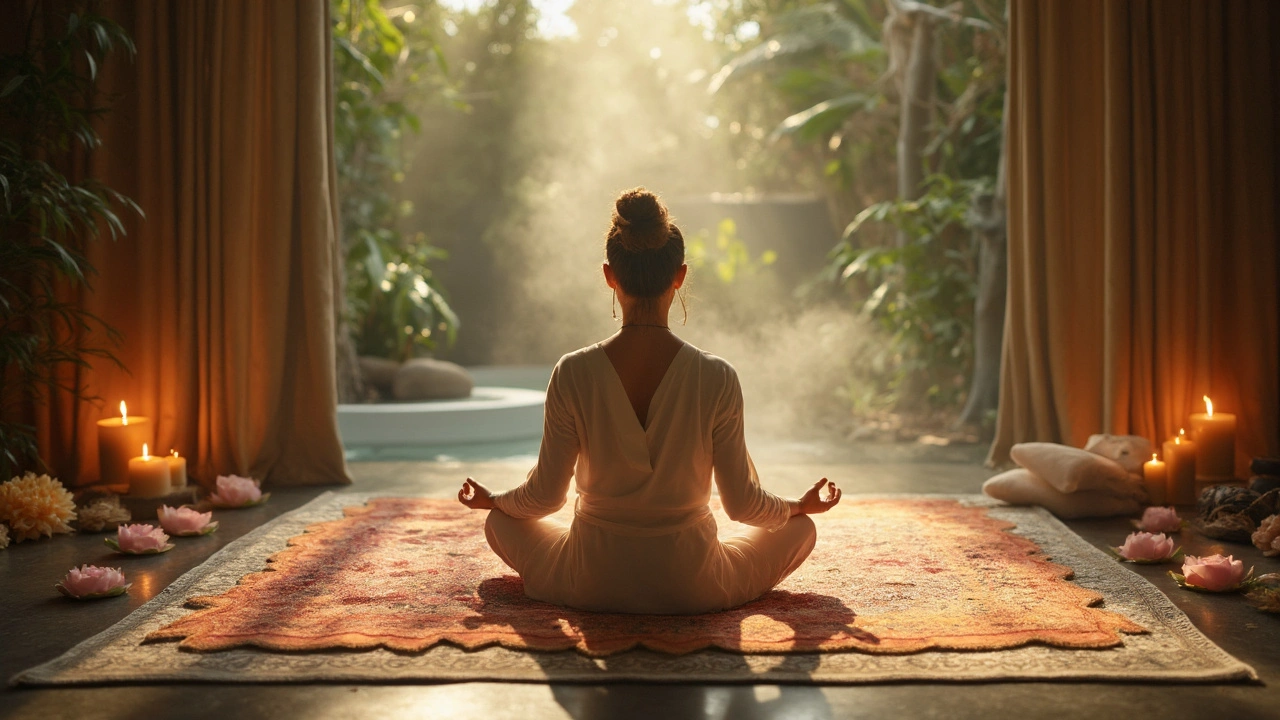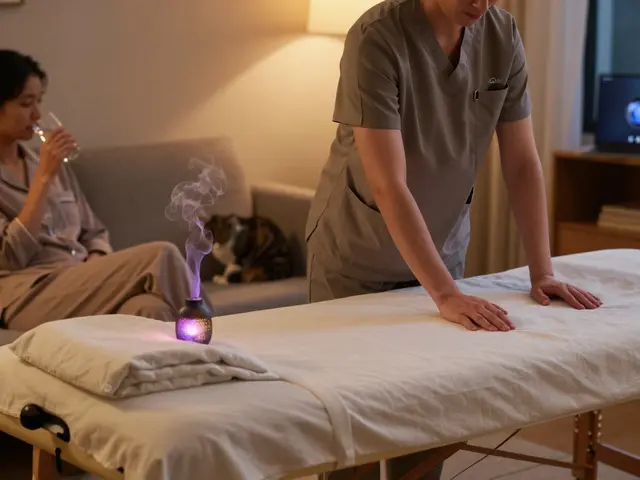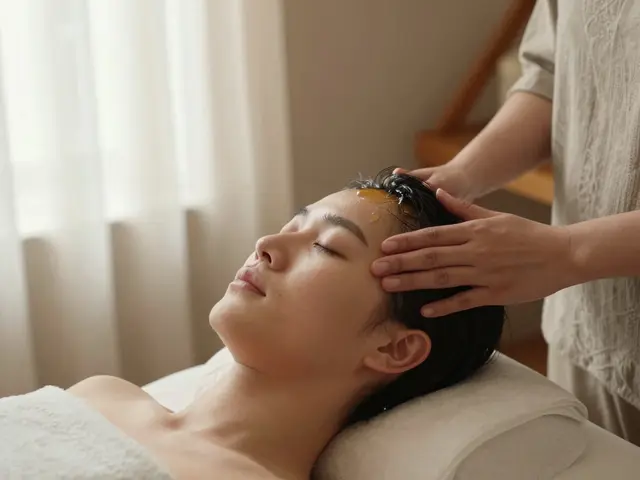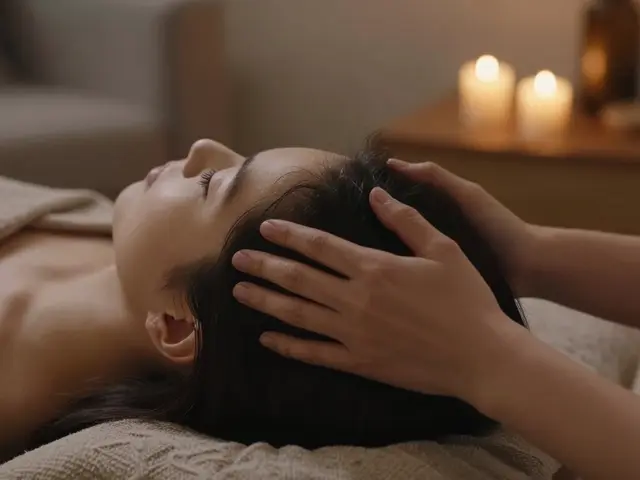Ever find yourself tossing and turning every night, desperate for some decent shut-eye? You might want to consider giving Thai massage a shot. It's more than just a treat after a tough day; it's like a reset button for your whole sleep routine.
Think of Thai massage as yoga's laid-back cousin. It stretches and kneads your body, flushing out tension and putting you in a state of blissful calm. This isn't just about pampering: it's about enhancing your well-being and paving the way for deeper, more restful sleep.
Wondering how it works? Well, Thai massage focuses on specific pressure points and gentle stretching to boost circulation and ease muscle tension. That not only relaxes your body but can also quiet your mind, making it easier to slide into dreamland and stay there.
- Understanding Thai Massage
- The Science Behind Better Sleep
- Key Techniques for Relaxation
- Health Benefits You Didn't Expect
- How to Incorporate It Into Your Routine
- Choosing the Right Therapist
Understanding Thai Massage
So, what's the big deal with Thai massage, and why is it touted as a game-changer for sleep? Well, the roots of this practice stretch back over 2,500 years, blending acupressure, Ayurvedic principles, and assisted yoga. It's like a full-body workout where you just lay there and let the therapist do all the heavy lifting.
Thai massage differs a bit from your typical massage. Forget the oils and dim lights; you won't be lying on a table, either. Instead, you're on a comfortable mat, dressed in loose clothing, ready for the therapist to guide you through a series of positions. Think of it as yoga, but without the self-inflicted sweat.
The magic happens through a mix of rhythmic motion, pressure, and stretching, which helps unblock and balance the body's energy channels, called 'Sen'. This balance is crucial because when your body's energy flows smoothly, you're less stressed and more relaxed, which is exactly what you need for better sleep.
Here's a fascinating fact: Thai massage isn’t just popular in Thailand. It's widespread across the globe, and people are catching on to its benefits. According to some massage therapists, many clients who've struggled with insomnia find relief after integrating this practice into their routines.
One of the unique aspects of Thai massage is its use of thumb and palm presses along various pressure points. This technique aids in relieving knots and tension that we unintentionally build up over time.
Overall, Thai massage is not just about relaxation—though that's a massive plus. It's a holistic approach that harmonizes the body and mind, setting the stage for a night of blissful, uninterrupted sleep.
The Science Behind Better Sleep
So, why does Thai massage work wonders for sleep? It all boils down to how our bodies respond to stress and relaxation. Picture this: when you're stressed, cortisol levels spike, making it hard to relax, let alone sleep. Thai massage helps lower these cortisol levels, leading to relaxation and better sleep quality.
One of the secrets lies in the techniques used. The massage involves rhythmic compressions and stretches that activate the parasympathetic nervous system, also known as the rest-and-digest system. This activation promotes a calming effect and a decrease in heart rate, perfectly setting the stage for a night of restful sleep.
Another fascinating aspect is how Thai massage can increase the production of serotonin. This neurotransmitter not only improves mood but also serves as a precursor to melatonin, the hormone that tells your body it's time to hit the hay. More serotonin means better regulation of your sleep-wake cycle.
In addition to this, a 2024 study found that people who received regular Thai massages reported a significant improvement in sleep quality compared to those who didn't. It's one of those simple yet effective changes that could make all the difference in your nightly routine.
If you've been on the fence about trying Thai massage, knowing the science behind it might just tip the scales. It's about more than relaxation; it's about giving your body the right signals to drift off into a deep, restorative slumber.
Key Techniques for Relaxation
Unwinding from a stressful day can sometimes feel like a daunting task. Luckily, Thai massage brings some time-tested techniques to the table that can help guide you towards genuine relaxation and ultimately lead to better sleep.
The first thing you'll notice in a Thai massage is its unique blend of dynamic stretches and pressure point work. These aren't random pokes and pulls. Each move is meticulously crafted to loosen tight spots in your body. By gently pressing on muscles and incorporating meaningful stretches, it encourages the flow of energy, making you feel lighter and more at ease.
Ever heard of the 'Sen' lines? These are energy pathways where a lot of focus is placed during a Thai massage. The techniques often involve using the hands, feet, elbows, and knees to apply rhythmic pressure on these lines, which not only relaxes sore muscles but can also boost circulation and relieve stress—two heavy hitters in the quest for better sleep.
- The Palm Walk: Think of this as a gentle massage performed with palms on large muscle groups. It's fantastic for easing tension while promoting relaxation, so your body can let go.
- Thumb Press Pressure Points: This involves using thumbs to apply pressure to specific points on the body. It's known to improve circulation and alleviate energy blockages.
- Gentle Stretching: A staple of Thai massage, these stretches help improve flexibility and mobility, making your body feel looser and more open.
For those stats lovers out there, a study has shown that people who engaged in regular Thai massage sessions reported a remarkable improvement in sleep quality.
When considering adding Thai massage to your routine, take a note: it's all about communication with your therapist. Whether you're a beginner or a seasoned pro, discuss any specific areas you'd like to focus on, especially if sleep issues are at the forefront. And keep in mind, consistency is key. A regular session can work wonders for your sleep cycle over time.
In short, by including these techniques in your routine, you're not just indulging in a massage; you're investing in your sleep quality, making those restless nights a thing of the past.

Health Benefits You Didn't Expect
When you think about Thai massage, better sleep is probably the first thing that comes to mind. But here's a little secret: this ancient practice is loaded with perks you might not even realize.
For starters, Thai massage is a champ at improving flexibility. Everything's connected, right? When your muscles are more limber, it helps your body function better overall. This is like giving your joints a little TLC, which means moving around during the day feels way easier.
Got some aches and pains? Thai massage can be a lifesaver. It's great for relieving chronic pain, especially in the back, shoulders, and neck. Say goodbye to those annoying twinges after a long day.
And it doesn't stop there. Have you ever felt mentally foggy, like you're stuck in a haze? The increased circulation you get from a good massage session boosts oxygen flow to your brain, helping you think clearer and stay sharp.
There's also this mood-lifting aspect. Thai massage releases serotonin and reduces cortisol, which means you're battling stress with a one-two punch. You'll walk away not just feeling relaxed, but genuinely happier.
- Boosts flexibility and joint health
- Relieves chronic pain and cramps
- Improves mental clarity and focus
- Lowers stress and anxiety levels
- Enhances overall well-being
So when you're considering this practice, know you're signing up for more than just relaxation. You're investing in all-around health, which is a win-win in my book.
How to Incorporate It Into Your Routine
If you’re sold on the idea of Thai massage to boost your sleep, figuring out how to make it part of your routine is the next step. Here's a simple guide to help you integrate this soothing practice smoothly without upending your whole schedule.
First things first, decide how often you want a Thai massage. For a solid return on relaxation, aim for at least once a week. Understandably, life is busy, and more frequent sessions can be hard to fit in. Just find a rhythm that works with your calendar.
- Find a Qualified Therapist: It all starts with choosing the right expert. Look for certifications and read reviews before making a choice. A good therapist will tailor the session to your needs, ensuring you get maximum relaxation.
- Schedule Regular Sessions: Try making it part of your weekly routine. Whether it’s your wind-down Friday activity or a weekend treat, having a set time helps you stick with it.
- Create a Relaxing Environment at Home: After your session, don’t rush. Set up a cozy spot at home with dim lights and calming music to extend the peaceful vibes you’ve just enjoyed.
- Pair It with Bedtime Rituals: Combine your massage day with other sleep-friendly habits like a warm bath, herbal tea, or some light reading to prepare your mind and body for sleep.
- Listen to Your Body: Notice how your body feels before and after each session. If you find mornings leave you energized, it might not be the best for pre-bedtime. Adjust as needed.
Don’t underestimate the impact of consistency. Just like any other self-care practice, the benefits of Thai massage for sleep improve over time. Give it a shot, and see if those restless nights start to transform into restful slumbers.
Choosing the Right Therapist
Picking the right Thai massage therapist can be the key to unlocking those sleepy nights you've been dreaming of. It's not just about finding someone who gives a good massage; it's about ensuring they've got the right experience and vibe to suit your needs.
When hunting for a therapist, check if they are certified and have proper training in Thai massage techniques. Legit pros often have certifications hanging around their practice areas, so ask if you're unsure. You want someone who knows the ropes, not someone winging it after watching a few online videos.
Next, ask around or read up on reviews. Personal recommendations from friends or family who've had amazing experiences can direct you to someone great. Also, online reviews can give you an honest look at what you’re getting into.
Another thing to consider is the environment of their workplace. The place should feel comfortable and welcoming because your relaxation depends as much on the surroundings as on the technique itself. Think soothing music, warm lighting, and a generally calm aura.
It's always smart to have a chat with your therapist before diving in. Discuss any specific issues you’re facing—like trouble sleeping—and any fears or priorities you have. A good therapist will listen and tailor the session to fit you perfectly.
Lastly, trust your gut. If something doesn't feel right or if you're just not comfortable, it’s okay to walk away. Remember, this is about your health and well-being. You deserve the best relaxation tips and the right touch to really make a difference.








